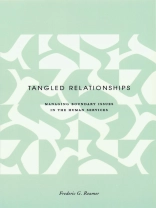Should a therapist counsel a former lover or accept a client’s gift? If so, has a boundary been crossed? Some boundary issues, like beginning a sexual relationship with a client, are obvious pitfalls to avoid, but what about more subtle issues, like hugging a client or disclosing personal information to a client? What are the boundaries of maintaining a friendship with a former client or the relative of a client? When do conflicts of interest overburden the client-practitioner relationship?
Frederic Reamer, a leading authority on professional ethics, offers a definitive and up-to-date analysis of boundary issues, a rapidly emerging topic in the field of human services. One of the only works in the field to provide a conceptual framework for the dual relationship between practitioner and client, this book provides an in-depth look at the complex forms these relationships take. It also gives practical risk-management models to aid human service professionals in the prevention of problematic situations and the managing of dual relationships. Reamer examines the ethics involving intimate and sexual relationships with clients and former clients, practitioners’ self-disclosure, giving and receiving favors and gifts, bartering for services, and unavoidable and unanticipated circumstances such as social encounters and geographical proximity. Case vignettes that help illustrate important points are also included in each chapter.
Содержание
Preface
1. Boundary Issues and Dual Relationships: Key Concepts
Boundary Issues in the Human Services
A Typology of Boundary Issues and Dual Relationships
Managing Dual Relationships
Sound Decision Making
The Role of Practitioner Impairment
2. Intimate Relationships
Sexual Relationships with Clients
Sexual Relationships with Former Clients
Counseling Former Sexual Partners
Sexual Relationships with Clients’ Relatives or Acquaintances
Sexual Relationships with Supervisees, Trainees, Students, and Colleagues
Physical Contact
3. Emotional and Dependency Needs
Friendships with Clients
Unconventional Interventions
Self-disclosure
Affectionate Communications
Community-based Contact with Clients
4. Personal Benefit
Barter for Services
Business and Financial Relationships
Advice and Services
Favors and Gifts
Conflicts of Interest
5. Altruism
Giving Gifts to Clients
Meeting Clients in Social or Community Settings
Offering Clients Favors
Accommodating Clients
Self-disclosing to Clients
6. Unavoidable and Unanticipated Circumstances
Geographic Proximity
Conflicts of Interest
Professional Encounters
Social Encounters
Epilogue
Об авторе
Frederic Reamer is professor of social work at Rhode Island College and was chair of the NASW Code of Ethics Revision Committee. His previous books include Ethical Dilemmas in Social Service, Social Work Values and Ethics, Social Work Malpractice and Liability, The Philosophical Foundations of Social Work, AIDS and Ethics, The Foundations of Social Work Knowledge, Rehabilitating Juvenile Justice (with Charles Shireman), and Social Work Research and Evaluation (all published by Columbia).












